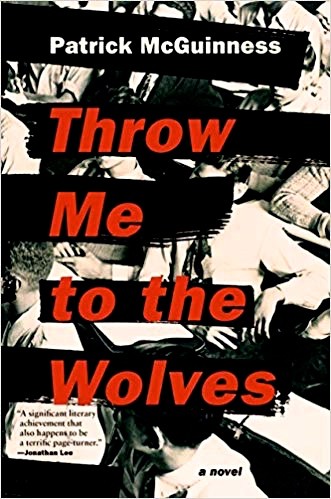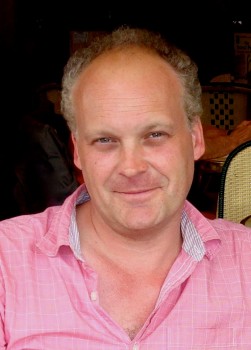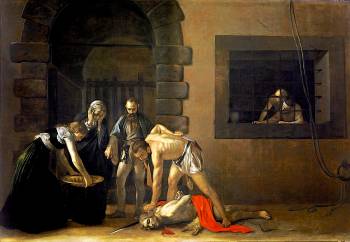Note: Patrick McGuinness was WINNER of the Wales Book of the Year, WINNER of the Writers’ Guild Award for Fiction, and WINNER of the Prix du Premier Roman Etranger for French translation for his debut novel, The Last Hundred Days in 2012. This is his second novel.
“Death’s tenses are important; it’s one of the ways the shrinks and forensic speech scientists catch the inconsistencies in the murderer’s stories – how they might accidentally use the past or overemphatically use the present; how they are relieved when the body is found because they don’t any longer need to watch their tenses, because they can finally talk about their victim in the past – which is where they put them.”
 Patrick McGuinness became a favorite when I reviewed his first novel in 2012, The Last Hundred Days, the story of the days leading up to the fall of Nicolae Ceausescu, ruler of Rumania for twenty-four years until he was driven from power in 1989. With a broad view of history, a vibrant sense of his characters and their struggles, and the ability to tell a big story in language so vivid that the reader actually experiences the events, he turned this complex novel of political history into a literary prize-winner. He continues his career with this second novel, Throw Me to the Wolves, a book which inevitably will be called a “murder mystery,” though that so underestimates McGuinness’s literary performance that it is almost an insult to limit it that way. Here the author uses the real murder of a young woman and its aftermath in the small British community in which she and the suspect both live as the starting point for a comprehensive study of the town’s various social groups, their values, their history, and the extent to which the citizens will force their wills on others to protect their own vision of what a community is and should be. What begins as a “detective story” quickly becomes an enthralling story of social interaction and reaction, a story of deep conflicts and divides, one in which, ultimately, characters must tread that narrow line between promoting communal values and protecting one’s own sense of self.
Patrick McGuinness became a favorite when I reviewed his first novel in 2012, The Last Hundred Days, the story of the days leading up to the fall of Nicolae Ceausescu, ruler of Rumania for twenty-four years until he was driven from power in 1989. With a broad view of history, a vibrant sense of his characters and their struggles, and the ability to tell a big story in language so vivid that the reader actually experiences the events, he turned this complex novel of political history into a literary prize-winner. He continues his career with this second novel, Throw Me to the Wolves, a book which inevitably will be called a “murder mystery,” though that so underestimates McGuinness’s literary performance that it is almost an insult to limit it that way. Here the author uses the real murder of a young woman and its aftermath in the small British community in which she and the suspect both live as the starting point for a comprehensive study of the town’s various social groups, their values, their history, and the extent to which the citizens will force their wills on others to protect their own vision of what a community is and should be. What begins as a “detective story” quickly becomes an enthralling story of social interaction and reaction, a story of deep conflicts and divides, one in which, ultimately, characters must tread that narrow line between promoting communal values and protecting one’s own sense of self.
 Based on the true story of the murder of Joanna Yeates in 2010, the novel takes place in Kent, where an elite private school prepares students for an equally elite college life. The author himself attended such a school, though he was not part of the social elite, and he became an admirer of one of his teachers there, Christopher Jefferies, a quiet, studious man to whom he says, in an interview, he owes a great personal debt. Years after McGuinness graduated, the murder of Joanna Yeates, an acquaintance of his now-retired teacher/advisor, led to the teacher’s questioning by the police who had, at the time, no other suspect. The local press went wild, dredging up past students who loved seeing their names in the paper as they made statements attacking the teacher and inventing “facts” which affected the perception of the teacher by the press and within the community. Eventually, the embroidered stories quoted in the local papers, the desire of some investigators and journalists to profit professionally from their increasingly extreme editorializing, and the desire of some jealous citizens in the community for payback regarding this elite school and its students created such a toxic atmosphere that many residents considered the case closed before there had even been an arrest. McGuinness uses all these real situations, familiar to those whose “news” is so often based on conjecture, to create in this novel an atmosphere in which the rumors about the case soon supersede the facts, and the former teacher becomes victimized in ways from which no kind and sensitive person could ever possibly escape unhurt.
Based on the true story of the murder of Joanna Yeates in 2010, the novel takes place in Kent, where an elite private school prepares students for an equally elite college life. The author himself attended such a school, though he was not part of the social elite, and he became an admirer of one of his teachers there, Christopher Jefferies, a quiet, studious man to whom he says, in an interview, he owes a great personal debt. Years after McGuinness graduated, the murder of Joanna Yeates, an acquaintance of his now-retired teacher/advisor, led to the teacher’s questioning by the police who had, at the time, no other suspect. The local press went wild, dredging up past students who loved seeing their names in the paper as they made statements attacking the teacher and inventing “facts” which affected the perception of the teacher by the press and within the community. Eventually, the embroidered stories quoted in the local papers, the desire of some investigators and journalists to profit professionally from their increasingly extreme editorializing, and the desire of some jealous citizens in the community for payback regarding this elite school and its students created such a toxic atmosphere that many residents considered the case closed before there had even been an arrest. McGuinness uses all these real situations, familiar to those whose “news” is so often based on conjecture, to create in this novel an atmosphere in which the rumors about the case soon supersede the facts, and the former teacher becomes victimized in ways from which no kind and sensitive person could ever possibly escape unhurt.

A fatberg, like this one, floating in the waters of North Amsterdam, is a continuing symbol here. (Real life) researchers Mike Thompson and Arne Hendricks are studying these as part of their investigation into what fatbergs mean for the future of food. Story in Footnotes.
The novel, set in the 1980s, deals with a similar murder and teacher/suspect. Here McGuinness creates two detectives who are totally different, allowing him to show the comparisons and contrasts in their ideas and values and the growth of both of them as they investigate the murder of Zalie Dyer, whose body has been found in a “bin-bag” near the river Thames. Ander, a lead detective, is the child of parents from Ghent, an immigrant who was taught English by his teacher Mr. Wolphram, who becomes a suspect. Called “Prof” by Gary, his partner, because of his degrees in psychology and criminology, Ander does not initially indicate to Mr. Wolphram or anyone else that he knows him from over fifteen years ago, wanting to stay objective under circumstances which will be difficult for both of them. Gary, by contrast, is from a working-class background, more prone to using his own observations in forming his opinions. Together they work well, with Ander taking a long view and Gary more concerned with the immediate. Not worried about the soul or the spirit or mortality, Gary worries about “fatbergs,” composed of waste and litter and the cast-off and the used-up, clogs of waste which accumulate under our feet, a symbol which returns throughout the novel as the murder is investigated and the press becomes involved.
In one episode which no reader will ever forget, McGuinness describes an event involving Danny McAlinden, Ander’s best friend, the son of an Irish father and English mother. With the aid of a truly demented teacher, Dr. Monk, the deputy head of school and the only one with a PhD., the bullies of the class are encouraged to hold a mock trial of Danny, a thirteen-year-old scholarship student whom they abuse viciously because of his Irish father at a time in which the IRA was active in the UK. It is not surprising that another symbol, that of the beheading of John the Baptist, by Caravaggio, a painting which Mr. Wolphram has in his classroom, appears as the aftereffects of the experience with Danny are unfolding. Commentary on the effects of the school atmosphere on faculty also appears, as the best and most sensitive teachers seem to disappear after one term. Gradually, the depiction of the faculty becomes a vicious satire of the “thrill of the safe,” those who have nothing to lose, while many young students, like Danny, have everything to lose. Mr. Wolphram, whose innocence has been questioned from the beginning, is at the mercy of the press, the community, and his own sense of who he is.
Patrick McGuinness is a writer so thought-provoking and so talented in his ability to make the reader understand big issues that it is difficult for me to believe that he has received so little attention and praise in the US. His debut novel, The Last Hundred Days, was Shortlisted for the Costa First Novel Award in 2011, and was Winner of the Wales Book of the Year Award in 2011. While prizes and nominations do not ensure that a book is brilliant and/or important in contemporary literature, it is a clue that it does have a lot of wonderful surprises, and McGuinness is so good in that area that I can think of few contemporary writers that are his equal. This novel may attract a bigger audience than one about Romania. I just hope that we do not have to wait another seven years before we are able to read his third novel.
ALSO by McGuinness: THE LAST HUNDRED DAYS
Photos. The author’s photo appear on https://commons.wikimedia.org/
Mike Thompson and Arne Hendricks are studying the existence and creation of fatbergs, a continuing symbol here, as part of their study regarding the future of food. That story and interview is here: http://www.brokennature.org/
The Beheading of St. John by Caravaggio, 1608, a painting Mr. Wolphram has in his room. It becomes an ironic symbol here. https://commons.wikimedia.org/
This ancient quotation by Diogenes (as stated here) or by Seneca (as stated elsewhere) is a hopeful and ironic thought in the midst of the troubles of Mr. Wolphram. https://www.goalcast.com/2019/03/15/seneca-quotes/


